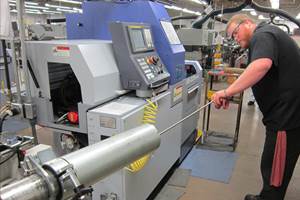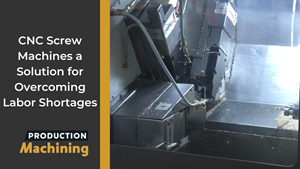Inventory Control Systems For The Shop
An ongoing effort towards more efficient operations drove this shop to take a closer look at indirect material usage, subsequently leading to implementation of a new system for tracking toolroom inventory.
Maintaining control of toolroom inventory is only one of the many tasks a manufacturing business must face each day to stay on top of budgetary concerns and to streamline operations. While a number of systems are available for tracking the use of tools and supplies, the latest advancements in this technology can require certain adaptability. That is why a company such as Crown Equipment Corporation (New Bremen, Ohio), who has proven its ability to change with the times, is a natural candidate to make use of such products.
Founded in 1945, the company originally manufactured temperature controls for coal-burning furnaces. As these products became obsolete, Crown embraced newer technologies. The company produced antenna rotators that were used to enhance television reception and, later, moved into the repair and manufacturing of mechanical and electronic components for private industry and government. By 1957, the company diversified once again, shifting to the material handling industry and producing lift trucks for intermediate-duty use. Today, with six U.S. manufacturing locations and strong international presence, the company is supplying a variety of electric lift trucks for industrial applications.
To keep up with its diverse and growing business, Crown requires access to inventory 24 hours a day, 7 days a week. The company is taking further steps to create a leaner manufacturing environment by transitioning to faster, more accurate toolroom inventory management, thus ensuring that employees can access what they need regardless of the time of day.
A Better Way
In the company’s ongoing effort for productivity improvement, it became apparent that there must be a better way to manage indirect materials than what was currently in place. Brenda Hughes, toolcrib supervisor and buyer at Crown noted, “We really needed to get product to the operators on the machines. We felt our replenishment was effective, but unavailability for all three shifts was hurting production.” The company began to look at RFID (radio frequency identification) to help with the indirect material challenges.
Close Being a manufacturer of lift trucks, Crown had RFID on its radar screen, and the benefits of this technology to material handling and logistics operations are becoming more recognized. However, with the growing industry buzz around RFID, Crown began to investigate the possibility of expanding its RFID use to manage indirect materials and solve the challenge of providing 24-hour access.
Conceptually, Crown believed that RFI would enable its employees to simply walk in a crib, pick up their supplies, and get back to work. Was this possible? Their research uncovered the Cribmaster Accu-Port, from WinWare (Marietta, Georgia), which is a commercial off-the-shelf (COTS) inventory management system geared specifically for managing indirect materials. WinWare has partnered with Symbol Technologies (Holtsville, New York) to provide the antennae and readers to power the Accu-Port, and the company has designed a plug-n-play portal specifically for managing indirect materials. The CribMaster system uses passive RFID technology and Gen2 passive tags.
The passive methodology requires very little involvement from machine operators. RFID tags on their name badges determine who has access to the toolcrib. Once permitted access, an employee can select the tools they need, and as they exit the toolcrib, the tagged items are automatically scanned and logged. Employees have access to the tools at any time without anyone actually staffing the crib. What was a 24-hour position to maintain toolcrib inventory has been reduced to an hour and a half, light-duty restocking job, with simple computerized inventory tracking.
Tag—You’re It
Even with all the advantages of the new tracking system, the common issue of tagging small, expendable items with RFID was still on the table. It is hard to imagine attaching a tag to a screwdriver or drill bit, but with WinWare’s help, Crown discovered another way: Tag the packaging, not the product. Crown implemented a system in which items are placed in bags with the corresponding label and RFID tag. The advantage is that once a worker takes an item and walks out of the crib, he or she simply removes it from the bag, places the bag in a “mailbox” and that packaging can be used again and again. This process not only minimizes the cost of tags, but also limits the effort of restocking.
Crown’s employees can now find items and even move the entire crib with ease. All items have been tagged and stocked according to a coordinate system. If for any reason the crib needs to be moved, the walls can be taken apart, shrink-wrapped and moved with all products still attached. The dismantling and reassembly can be completed in one day.
With tagging taken care of and the mailbox system in place, restocking became easier than ever. At Crown, each crib monitors the movement of 200 to 300 items each day. In Crib 1, every one of the products is an expendable item, and therefore, must be replaced.
This process reduces restocking time and allows Crown employees to focus on other aspects of their indirect supply chain. With RFID, the employee can simply refill the bags and take as many as 30 items back into the crib at a time. Here, all 30 are recorded and assigned to the tag instantly.
ROI Determines Success
Crown has the CribMaster Accu-Port in only one area of the operation so far, but is already recognizing considerable benefits. Return on investment (ROI) studies have proven a substantial impact, and this savings has allowed Crown to justify the system with reduced inventory usage alone. Using reportable purchasing information, Crown has acknowledged that since implementing the Accu-Port crib, its daily average inventory usage has been reduced by 21.65 percent. This reduction has provided an ROI of less than 4 months, even when considering only inventory usage.
Other soft costs that are harder to quantify also lend to shortened ROI. Having a central toolcrib has reduced walk time for an operator from the machine. With easily accessible tools, employees can return to work more quickly, contributing to less machine downtime.
Continuous Improvement
Some continuous improvement plans for Crown include expanding its RFID network. Ms. Hughes foresees nine to ten Accu-Ports across her facilities by 2010. This consolidation will give her the ability to use bulk-buying incentives, while the mobility and easy “go live” of the cribs will make this transition period run smoothly. RFID ended up being a no brainer for Crown. It saved on tags and reduced restock time with the innovative identification scheme of tagging the packages. Employees can maximize the system’s potential with ease, but more importantly, they can finally reach the tools they need around the clock.
Crown has found that RFID tagging and the CribMaster Accu-Port have made a significant contribution to solidifying the company’s indirect material inventory management. Ms. Hughes says, “We are looking forward to the savings once all five plants are up and running with RFID.
Related Content
Job Candidate Questions and What They Tell Us
Individuals who ask thoughtful, original questions in the interview set themselves apart.
Read More6 Tips for Training on a Swiss-Type Lathe
There are nuances to training a person to effectively operate a Swiss-type lathe. A shop I visited a while back offers some suggestions.
Read MoreVideo Tech Brief: CNC Screw Machines a Solution for Overcoming Labor Shortages
CNC screw machines can exceed job shop productivity and enable manufacturers to overcome perpetual employment gaps.
Read MoreCNC Machine Shop Employment Positions to Consider Beyond Machine Operators
Many machine shops have open machine operator positions to fill. But does it make sense for shops to also seek automation engineers, IT managers and assembly personnel?
Read MoreRead Next
Shop Management Software Helps All The Shop's Managers
Here’s a case where free shop management software proved so valuable to a company that it purchased three more seats of it in a short amount of time.
Read MoreChanging Shop Management Software Takes Teamwork
Manufacturer’s hardware platform and shop software upgrades bring added flexibility, simplicity and speed to the network and its processes.
Read MoreDo You Have Single Points of Failure?
Plans need to be in place before a catastrophic event occurs.
Read More












.jpg;maxWidth=300;quality=90)









